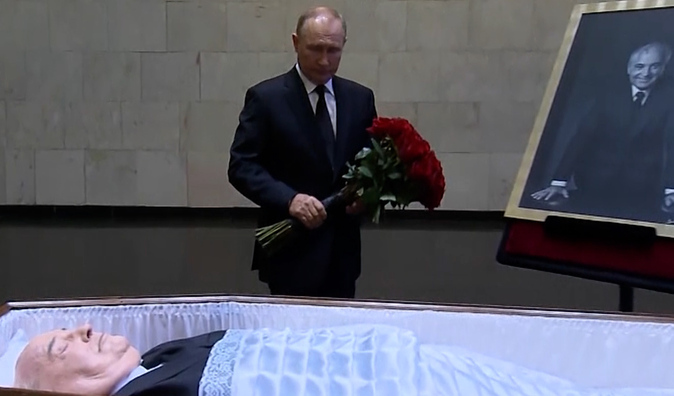Russia Vladimir Putin ignores Gorbachev
Analysis Gorbachev, the architect who destroyed the USSR while trying to save it
Vladimir Putin
will not attend the funeral of the last leader of the USSR,
Mikhail Gorbachev
, who died on the 30th. His agenda does not allow it.
"We know that the farewell ceremony will take place on September 3, and also the funeral, but unfortunately, the president's work schedule will not allow him to come on September 3, so he decided to do it today," said the president. Putin spokesman Dimitri Peskov.
The Russian leader said goodbye this morning to the first president of the USSR at the Central Clinical Hospital in Moscow, before flying to Kaliningrad.
Gorbachev will not have a state funeral like that of his successor in office,
Boris Yeltsin
, who died in 2007. That religious ceremony in honor of Yeltsin was attended by President Putin (with his then wife, Liudmila) and it was the first in his genre officiated in honor of a head of state since 1894, when Russia buried Tsar Alexander III.
For Gorbachev there will be no state funeral but "
there will be elements of a state funeral
in the sense that there will be a guard of honor," said the Kremlin spokesman, who did not give many more details except that "the state will help with the funerals."
"The farewell ceremony will be on September 3 from 10:00 a.m. to 2:00 p.m.
Access will be free for all Russians.
The funeral will take place on the same day," confirmed Vladimir Polyakov, representative of the Gorbachev Foundation.
The Soviet leader will be buried next.
The chronicle of that day will summarize the
character's ambivalence
.
The Russians coming to see him off at the same place where the funeral shrine of his Soviet predecessors, some famous for his brutality, was also placed.
The colonnaded hall of the House of Trade Unions was the penultimate stop for Vladimir Lenin, Joseph Stalin, Leonid Brezhnev, Yuri Andropov and Konstantin Chernenko.
But later, when the citizen pilgrimage ends, Gorbachev will be buried far from the Kremlin walls - where the main leaders of the old regime are - to be buried in the cemetery of the Novodevichi Convent.
There lie other important
figures who challenged the 'sacred' rules of the iron system
forged in 1917. Like Boris Yeltsin, who dismantled the USSR and threw Russia into the path of capitalist shock.
Or Nikita Khrushchev, who denounced Stalin's bloody repression and, like Gorbachev, lost power driven by the ambition of others.
Gorbachev assumed the leadership of the Central Committee of the Communist Party of the Soviet Union in 1985 and in March 1990 he was appointed president of the USSR.
He believed that the Soviet Union could be preserved without resorting to violence.
Isolated, he resigned in 1991. His failure was the latest evidence of the repressive nature of the regime he tried to reform.
Political prisoners
Under Gorbachev, many political prisoners were released.
Alexei Navalny
, the Russian dissident who has been jailed since January last year, learned of the former USSR leader's death on
prison radio
.
From there he pointed out that Gorbachev's life and management "will be evaluated much more favorably by descendants than by contemporaries."
In a 2017 survey, only 8% of Russian citizens valued it positively;
the opinion of the great majority was negative.
As Navalny explained on social networks through his collaborators, his own attitude towards the president of the USSR "evolved from wild irritation to
sad respect"
.
"Gorbachev will always be one of the few who did not use power (...) for personal benefit and enrichment.
He left power peacefully and voluntarily
, respecting the will of the voters. That is a great deed by the standards of the former USSR," reflected Navalny.
Gorbachev was a product of the Soviet regime, and yet he tried to change it.
The current regime has turned its back on him in saying goodbye to him, aware that his figure divides Russians and reminds them that Russia's ills were not cooked in Washington but in Moscow.
Gorbachev's daughter Irina is already in Moscow.
Her granddaughters will also come to say goodbye.
It is not clear which authorities and figures will accompany them in their farewell to a man who is respected worldwide and who the Kremlin itself has coldly described as "contradictory".
Conforms to The Trust Project criteria
Know more
Russia

